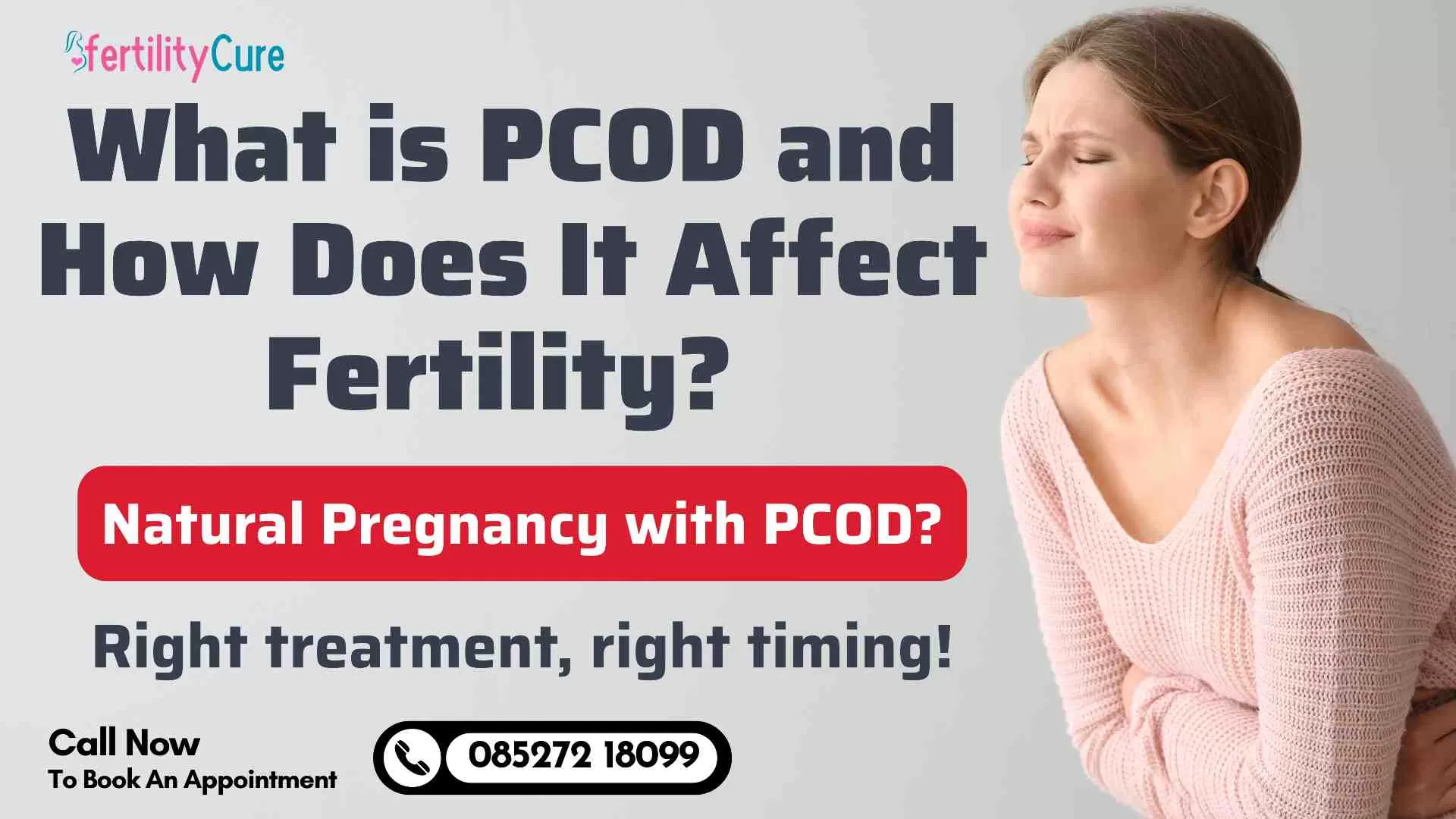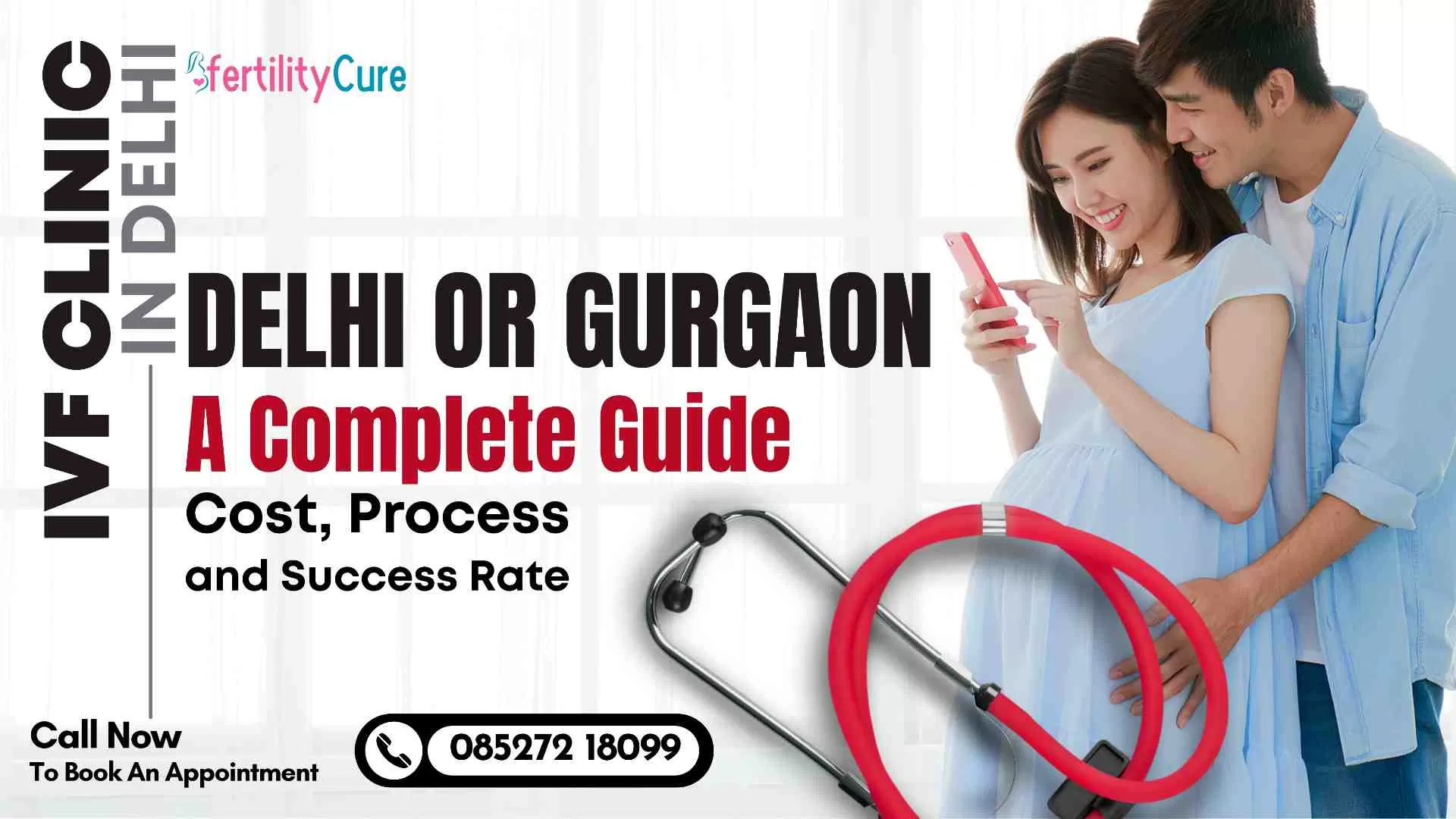What is PCOD and How Does It Affect Fertility? A Complete Guide for Women
by:Fertility Cure Centre
|
onMay 15, 2025
In:World
|
TypeHealth and Wellness Tips

Introduction
What do you do when your periods are never on time? Or when you suddenly start gaining weight even though your lifestyle hasn't changed? How do you deal with the hair fall, acne, or mood swings that come and go without reason? These signs may not seem important initially, but they can slowly hurt your confidence, health, and desire to have a child.
This is often where Polycystic Ovarian Disease (PCOD) quietly enters the picture. You don't always notice it right away. And that's what makes it more difficult—because you may not even realise something is wrong until months pass and you start wondering: Why am I not getting pregnant? What is happening inside my body?
The truth is that PCOD and fertility are deeply connected. It's not about irregular periods; it's also about how hormones work and how ovaries release eggs. If your hormones are out of balance, it can affect everything from your period to your chances of getting pregnant. And if you don't receive an explanation, the lack of understanding can make you feel lost and frustrated.
In this blog, you will learn about polycystic ovarian disorder (PCOD) and how it impacts fertility. You will also learn about the things you can do to improve your health and get closer to becoming a mother, including the natural and medical remedies that are available. This blog aims to give you honesty, clarity, and support, whether you're trying to conceive or just starting with PCOD.
What is PCOD?
Polycystic Ovarian Disease (PCOD) is a hormonal condition that affects how a woman’s ovaries work. But instead of showing up with clear, loud symptoms, it often hides behind things we ignore—like late periods, sudden breakouts, or weight gain that won’t go away no matter how hard you try.
PCOD occurs when the ovaries produce more male hormones (androgens) than they should. Because of this imbalance, the ovaries produce a few immature follicles (tiny fluid-filled sacs). These aren't harmful, but they prevent eggs from maturing and being released properly, which your body requires for regular periods and natural pregnancy.
When your body does not produce an egg every month (a process known as ovulation), it becomes even more difficult to conceive. Some women are unaware they have PCOD until they attempt to conceive and experience recurrent failures without knowing the root cause. That’s why PCOD affects fertility.
It’s also important to understand that PCOD is different from PCOS (Polycystic Ovary Syndrome), even though the names sound similar. PCOD is more common and usually less severe. But both involve hormonal issues and irregular ovulation.
So, if your body feels “off” and you’re wondering what’s happening, you’re not imagining things. PCOD in women is real, and it deserves more attention, care, and clarity.
Common Symptoms of PCOD
Sometimes your body tries to speak to you, but we don’t always know how to listen. That’s what happens with PCOD symptoms. They don’t always show up in a dramatic way. Instead, they slowly build up—until one day, you start wondering, Why is my body changing?
One of the most frequent symptoms is an irregular period. If your periods are delayed by weeks or do not arrive for months, that means your ovaries are not releasing eggs on a regular basis, which is a major cause of PCOD and infertility.
You may also notice sudden weight gain, especially around the belly, and no matter what you do, your weight doesn’t budge. Many women also struggle with acne, oily skin, or even excess facial hair, which can feel confusing and frustrating.
Then there are the things no one sees—like constant tiredness, mood swings, or fear that something’s wrong, but no one is taking it seriously.
Here are some common PCOD symptoms and how to recognise them:
- Irregular or missed periods: If your periods are irregular or are not on a regular cycle (every 28 to 35 days), or if you miss them for months, this is a definite sign of hormonal imbalance and ovulation problems caused by PCOD.
- Weight gain or difficulty losing weight: Many women with PCOD gain weight easily, especially around the lower abdomen. This weight is often resistant to diet and exercise because of insulin resistance, a common issue in PCOD.
- Hair fall or thinning hair: If you notice more hair on your pillow, comb, or in the shower—and your scalp starts to look patchy—it could be due to increased androgens (male hormones), which disrupt normal hair growth.
- Oily skin and acne: Breakouts that don’t respond to regular skincare or keep appearing around the jawline, chin, or cheeks can signal PCOD-related acne triggered by excess hormones and oil production.
- Facial hair or body hair growth: Noticeable hair on the chin, upper lip, chest, or stomach may appear darker or thicker. This condition, called hirsutism, is due to higher levels of male hormones in women with PCOD.
- Mood changes, anxiety, or low energy: You may feel low, anxious, or easily irritated without knowing why. PCOD affects not just your body, but also your mental health, because hormonal fluctuations influence your emotional state too.
If these signs feel familiar, it’s not “just stress” or “just hormones.” It could be your body asking for help. And the good news is—once you know the symptoms, you can start finding answers.
How PCOD Affects Fertility
For many women, the most painful discovery about PCOD doesn’t happen in the doctor’s clinic—it happens quietly at home, month after month, when that pregnancy test shows a single line again. You start asking yourself, What’s wrong with me? Why is it so hard to conceive? And the answer, for many, lies in how PCOD affects fertility on a deeper level.
The main problem is ovulation, which occurs when your ovary makes an egg every month. Women with PCOD often put off or don't finish this treatment. That's called anovulation, and it's one of the main reasons it's hard to get pregnant. The sperm can't fertilize an egg that hasn't been released.
Another big reason is a lack of hormones. When you have PCOD, your body makes too much of the male hormone androgen, which stops eggs from developing typically. The eggs may stay immature in the ovaries for a long time, making small follicles look like cysts. However, they never fully mature enough to cause ovulation. This is the reason why many women with PCOD have periods that come and go or don't come at all.
Even if ovulation does happen, PCOD can still affect egg quality, the endometrial lining, and hormonal signals needed for implantation. That means even when fertilization occurs, the body might not be fully ready to support a pregnancy.
This is why so many women don’t even realise they have a condition until they try to conceive and nothing works. It’s not your fault, and you’re not alone. PCOD and infertility are deeply connected, but with the right approach, pregnancy is still possible. It just takes more support, understanding, and sometimes medical help.
How Do You Know If You Have PCOD? Tests and Signs to Know
Sometimes, the hardest part isn’t the symptoms—it’s the not knowing. You feel something is off. Your periods go missing, your face breaks out like you’re a teenager again, your weight changes, and suddenly, even looking in the mirror feels confusing. You ask yourself, “What’s happening to me? Is this condition normal, or should I be worried?”
Many women with PCOD experience this feeling before receiving a diagnosis. It doesn’t hit you all at once—it creeps in slowly. And by the time you realise something might be wrong, you’ve already spent months feeling unsure.
So, how do you find out if it’s PCOD? The answer isn’t just one test or one symptom—it’s a mix of things your body is showing and what doctors check for. Here’s what usually happens:
- When you visit a gynaecologist, they’ll first ask about your period history. If your cycles are all over the place—sometimes coming late, sometimes not at all—that’s a big clue.
- Then come the blood tests. These check your hormones, especially androgens (male hormones), insulin levels, thyroid, and the LH/FSH ratio. If these are out of balance, it tells your doctor a lot about what’s happening inside.
- The next step is usually an ultrasound scan, where they look at your ovaries. If they see lots of small, underdeveloped follicles lined up (sometimes called a “string of pearls”), it points toward a PCOD diagnosis.
But here’s what no one tells you: getting tested isn’t just medical—it’s emotional. Because deep down, you’re scared. You wonder, “Will I be able to get pregnant?” or “Is something wrong with me?” That’s why getting a diagnosis gives relief, not fear. It gives you a name, a reason, and a path forward. You finally stop blaming yourself. You finally know what’s going on.
Can You Get Pregnant with PCOD?
One of the first thoughts that hits you after hearing the word PCOD is... "Can I still become a mother?"
And honestly? That fear is valid. It's real. It's the one question no one wants to ask out loud, but it sits heavy in the heart.
So let's say it clearly—yes, you can get pregnant with PCOD.
But the journey may look a little different. Not impossible. Just different.
Here's how it usually goes: with polycystic ovarian disease, your body doesn't release eggs regularly, or sometimes not at all. That's called anovulation, and it's one of the biggest reasons why getting pregnant feels delayed or more complicated than usual. Without regular ovulation, timing conception becomes guesswork—and that leads to confusion, stress, and endless waiting.
But here's the thing, most people don't realise: PCOD is treatable. And with the proper guidance—tracking your cycles, using ovulation medication, or even getting mild fertility support—you can conceive. Many women go on to have healthy pregnancies with just a few tweaks in their treatment or lifestyle.
Some may need help through IUI, ovulation-inducing medicines, or even IVF if required, but that's not where everyone starts. In fact, for many, making small changes like managing weight, reducing stress, or taking the right supplements can restart natural ovulation.
So, if you've been feeling like PCOD has shut the door on motherhood, please know that the door is still very much open.
You need someone to guide you through it.
Treatment Options for PCOD
Once you finally hear the diagnosis—PCOD—the next question comes fast: "How do I fix it?" And honestly, that question can feel overwhelming. Because if you start searching online, you'll find everything from hormone pills to yoga videos, and it's hard to know what's right for you.
The truth is, there's no one-size-fits-all answer. The best way to treat PCOD relies on your body, your symptoms, and your goals, especially if you want to get pregnant. Of course, there are real, tried-and-true ways to deal with it. You don't have to do everything at once, either.
Here's a breakdown of what treatment usually looks like:
- If you're not trying to conceive yet, doctors might prescribe birth control pills. These don't cure PCOD, but they help regulate periods, control acne, and lower male hormone levels in the short term.
- If you're trying to conceive, your treatment will be more specific. Your doctor may prescribe ovulation-inducing drugs like Clomiphene or Letrozole to assist the body in releasing eggs regularly. These drugs tend to be the starting point for women with PCOD trying to conceive.
- If medications are ineffective, then your doctor might suggest IUI or IVF based on your age, egg quality, and body response. Don't worry; most women don't start here. It is a later phase, and not everyone requires it.
- For some women with severe symptoms, there's a minor surgery called ovarian drilling, which lowers androgen levels and can help restart ovulation. It's not common, but it's available when needed.
Natural Remedies and Lifestyle Management for PCOD
Sometimes, the most powerful healing doesn’t start at a clinic—it starts at home. When you’re dealing with PCOD, your daily habits—what you eat, how you move, how you feel—play a much bigger role than most people realise. And the best part? You don’t need to do everything perfectly. You just need to start somewhere.
Let’s talk about the most important lifestyle steps to manage PCOD naturally:
What Foods Are Good for PCOD? -And What to Avoid
When it comes to the PCOD diet, food is more than just fuel; it is medicine. The right diet can help you maintain hormone balance, avoid insulin spikes, and return to a normal cycle.
- Eat foods that are low in glycemic index, like quinoa, oats, beans, and green veggies. To treat PCOD, it is important to keep your blood sugar stable.
- Include anti-inflammatory foods like turmeric, berries, flaxseeds, and fatty fish.
- Avoid sugary drinks, white bread, and packaged snacks—they often make PCOD symptoms worse by triggering insulin resistance. It’s not about strict dieting.
It’s about learning what your body needs—and choosing to nourish it, gently.
Which Exercise is Best for PCOD?
You don’t need to go to the gym every day. You just need to move your body in a way that feels sustainable and kind.
- Regular brisk walks, PCOD-focused yoga, or light weight training four to five days a week can be very beneficial.
- Exercise improves insulin sensitivity, helps regulate ovulation, and reduces stress levels—all of which support better hormone balance.
- You don’t have to overdo it. Even 30 minutes a day can bring surprising changes over time.
Think of movement as self-care, not punishment. Your body is asking to be supported, not controlled.
Best Supplements for PCOD Management
Along with food and exercise, some women find relief in safe, well-researched PCOD supplements that improve hormonal health and fertility.
- Myo-inositol and D-chiro-inositol help restore ovulation and improve egg quality.
- Vitamin D3 is often low in women with PCOD and is essential for hormonal balance.
- Omega 3s - from fish or flaxseed oil- reduce inflammation and support overall hormonal function.
Supplements aren’t shortcuts—they’re support tools.
But always consult your doctor before starting any new product.
These lifestyle changes don’t have to be overwhelming. Start with one small step—add one healthy meal, take one walk, or try one supplement. PCOD management is not about being perfect—it’s about being consistent with kindness.
PCOD and Long-Term Health Risks You Should Know About
When you're trying to understand PCOD, most conversations stop at periods and pregnancy. But what happens after that? What happens if you're not currently attempting to conceive, or if you've recently received a diagnosis of PCOD but don't exhibit any significant symptoms?
A lot of people don't talk about this part: If you don't take care of polycystic ovarian disease correctly, it can affect your long-term health as well as your ability to have children. That's not meant to scare you; it's meant to get you ready. When you know the risks, you can take steps to avoid them.
- Type 2 Diabetes PCOD: Women are much more likely to get diabetes, even at a younger age, because their bodies are less able to use insulin. This is why doctors check your blood sugar levels often, especially if diabetes runs in your family.
- High Blood Pressure and Cholesterol: An imbalance in fat metabolism caused by PCOD can lead to high LDL (bad cholesterol) and an increased risk of heart disease later in life. Monitoring your cholesterol is equally crucial as managing your hormones.
- Endometrial (Uterine) Cancer: Irregular periods are likely to be just one symptom, but if they occur regularly, the uterine lining might thicken over time. If it is not managed correctly, this increases the risk of endometrial cancer.
- Mood Disorders, Depression, and Anxiety: PCOD has a significant impact on both your mental and physical health. Hormonal variations, bodily changes, and fertility issues can all lead to a poor state of mind, stress, and even depression if not treated.
- Sleep Disorders and Fatigue: Many women with PCOD experience chronic tiredness, sleep apnea, or poor-quality sleep. It’s not laziness—your body is struggling to regulate its systems.
However, these risks can be treated. Managing PCOD symptoms early makes long-term health easy. Small changes to your behaviours, frequent checks, and self-kindness can help ensure your safety and balance.
What You Can Do Today to Start Taking Control of PCOD
PCOD can feel like too much—too many changes, too many questions, and never enough answers. But here’s something no one tells you: you don’t need to do everything at once. You just need to begin, softly.
Start by tracking your cycle and symptoms. Even a small note on your phone can help you make sense of the confusion.
Then, talk to a doctor, not just for medicine, but for real clarity and support. Ask your questions. You deserve answers.
If your body feels stuck, pick just one habit today. Maybe it’s a short walk. Maybe it’s skipping sugar for one meal. That’s enough.
And if your mind feels heavy, rest. PCOD care is about your whole self, not just your ovaries. You’re not behind. You’re just beginning—with more awareness than ever before.
Final Thoughts
If you've been this far, take a deep breath—because it shows you care. You're on a journey to learn more about your body, your symptoms, and what lies ahead. And that can be quite a challenge! Living with PCOD can sometimes feel isolating and challenging, particularly when your body doesn't respond as you hope it would.
But here's the truth: you're not broken. You're not less of a woman because your hormones are out of sync. And most importantly, you can still get pregnant, feel better, and live fully—with the proper support.
Whether you choose to start with lifestyle changes or speak to a fertility expert, the first step is always the hardest—but also the most powerful. There is no perfect way to heal, but there is always a way forward.
We're here at the Fertility Cure Center to help you. You don't need to go through this process alone. You can get help, get clear, or have someone listen.
Helpful Resources
- Contact Us: Schedule Your First Free Consultation with Us
- Post: Causes of Fertility and Infertility: Global Trends and IVF Insights
- Learn More: What is IVF and How Does It Work? Step-by-Step Guide for Beginners
- Explore: Fresh vs. Frozen Embryo Transfer: Which One is Right for You?
- Doctor Profile: Meet Dr. Seema Saxena
- Google Maps: Find Us on Google Maps


